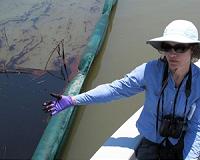| . |  |
. |
Washington (AFP) June 3, 2010 The spreading Gulf of Mexico slick is already the worst in US history, but its long-term effect on vulnerable ecosystems along the fragile coast remains virtually unknown, experts say. "The situation is the worst that I have known... but you don't know what the impact will be," said Michael Boufadel, civil and environmental engineering chair at Temple University in Philadelphia. But one thing Boufadel, an independent expert consulted by the US government, is certain of: "The impact will definitely be for years." Senior government officials agree. "The long-term effects on aquatic life are still unknown," Environmental Protection Agency Administrator Lisa Jackson has acknowledged. Three states have already been hit by the oil and more than 125 miles (200 kilometers) of Louisiana coast have been contaminated, triggering long-term fears for the region's endangered wildlife. Florida is expected to be next on the list of states affected by the spill since an April 20 explosion ripped through the Deepwater Horizon rig, 50 miles (80 kilometers) off the Louisiana coast, killing 11 workers. At least 20 million gallons are estimated to have already poured into the Gulf waters, and experts have warned of the presence of vast underwater plumes that cannot be measured from above. The big question for scientists is what effect particles of oil and chemical dispersants will have on the food chain of the various organisms that thrive in the Gulf. The dispersants break the crude into droplets and form plumes that are streaming deep under water from the ruptured BP well, which experts believe is gushing 12,000 to 19,000 barrels of oil into the Gulf a day. Suspended in water, the chemical particles can attach themselves to the small plants and nutrients that descend to the bottom of the Gulf where they become a food source for other living creatures. The fact that the oil and dispersants contain a variety of chemicals "makes predicting the long-term impact more difficult," said Boufadel, pointing to the possibility of genetic mutations or the outright loss of certain lifeforms. Boufadel has studied the 1989 Exxon Valdez oil spill in Alaska, previously the largest in the United States. But he noted that few studies have been made of the ecological impact of an oil spill in deep ocean waters and little is known about the effect of enormous water pressures on the composition of dispersants, which have never been used as such depths before. Marine biologist Eric Gordes, also of Temple University, worries that underwater currents will carry a new wave of plumes of oily mixture toward coral reefs some 25 miles (40 km) north of the leak. "As the oil gets broken down by the microbes, they are going to deprive the water directly affecting this coral community of oxygen," he said. "The worst-case scenario is that all of these things are happening at the same site and we will lose this coral reef, some of which was discovered a year ago." He noted that scientists would soon recover instruments on the seabed to determine the direction of the current. BP has said it will not be able to plug the gusher before August, when a relief well is completed. "By the time that happens, the total amount of oil spilled will... constitute a significant and very likely long-term threat to the overall health of the water of the Gulf of Mexico ecosystem, which is one of the more important in the Atlantic," said Douglas Rader, chief ocean scientist of the Environmental Defense Fund advocacy group. The Gulf waters are among the world's richest in terms of fish and seafood, accounting for 10 billion dollars in revenue each year for coastal states. "The impact constitutes a significant threat to the long-term integrity of the ecosystem that has to be better understood to both design containment and mediation programs," said Rader. "It's the worst-case scenario because it affects both a world coastal ecosystem and the offshore system... and this is without precedent in the world."
Share This Article With Planet Earth
Related Links Our Polluted World and Cleaning It Up
 US oil spill could last for weeks, officials warn
US oil spill could last for weeks, officials warnGalliano, Louisiana (AFP) May 31, 2010 BP officials warned Monday they may not be able to plug the Gulf of Mexico oil leak until August as Louisiana residents warned the spill would wipe out their way of life. "Drilling relief wells is still seen as the best solution," but they will not be onstream for at least eight weeks, BP spokesman John Currie told AFP, as US officials warned the spill is now the worst environmental disaster ... read more |
|
| The content herein, unless otherwise known to be public domain, are Copyright 1995-2010 - SpaceDaily. AFP and UPI Wire Stories are copyright Agence France-Presse and United Press International. ESA Portal Reports are copyright European Space Agency. All NASA sourced material is public domain. Additional copyrights may apply in whole or part to other bona fide parties. Advertising does not imply endorsement,agreement or approval of any opinions, statements or information provided by SpaceDaily on any Web page published or hosted by SpaceDaily. Privacy Statement |